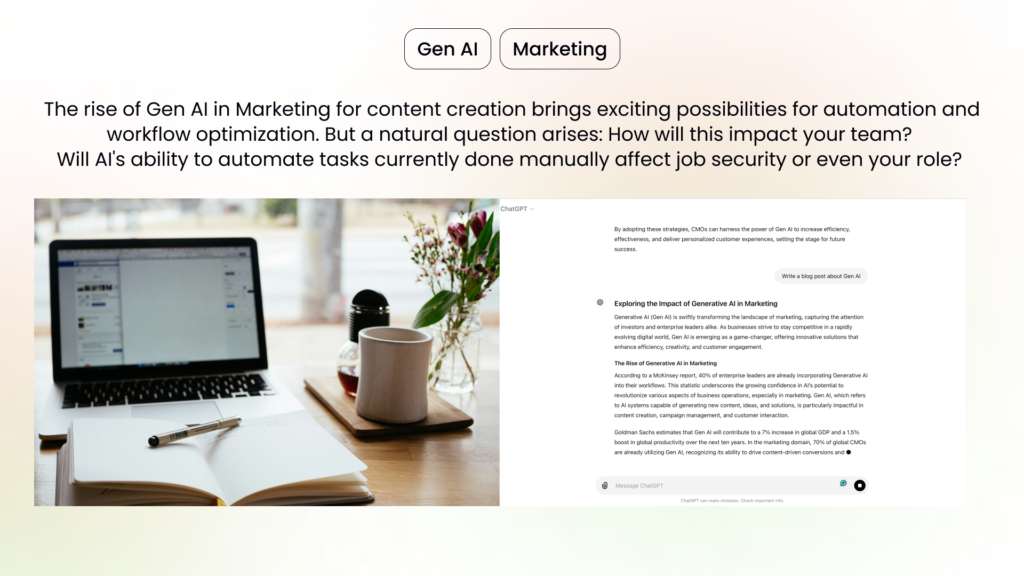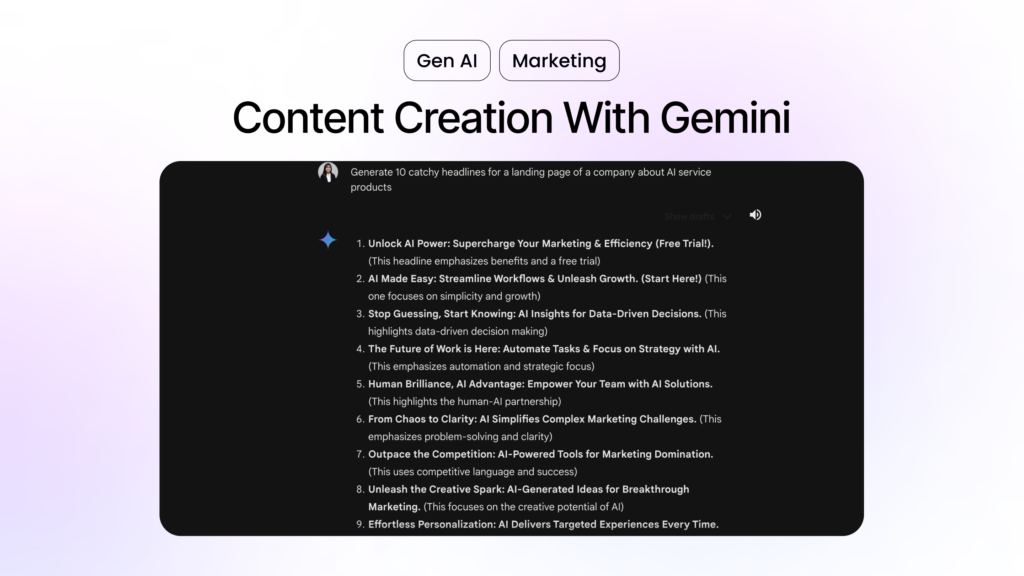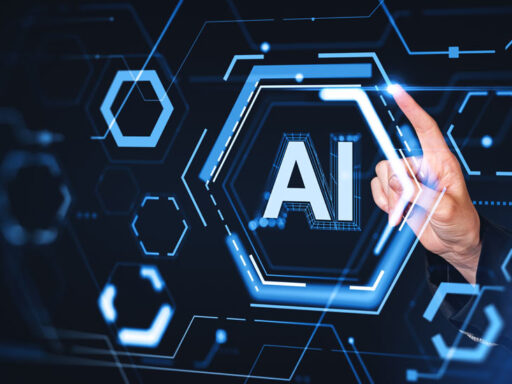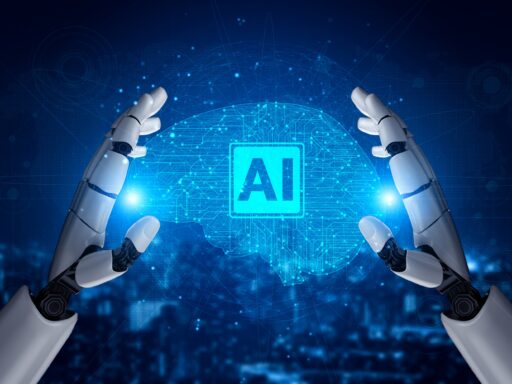Gen AI in Marketing is gaining significant attention from investors and enterprise leaders. McKinsey reports that 40% of enterprise leaders are already incorporating Generative AI into their workflows.
Goldman Sachs estimates that Gen AI will drive a 7% increase in global GDP and boost global productivity by 1.5% over the next ten years. In the marketing field, 70% of global CMOs are already adopting Generative AI, recognizing its potential benefits for content-driven conversions.
Anne Cheng, CEO of Supercharge Lab, shares that Gen AI leaves out 99% of available tools. Most Gen AI tools are designed to solve advanced analytics, predictive intelligence, and other automated processes.
Despite the optimism surrounding Generative AI in marketing, there are still uncertainties about its impact on marketing results. Concerns include a lack of trust in the technology, transparency issues, quality control problems, copyright concerns, and ethical considerations.
Additionally, the accessibility of Gen AI tools like ChatGPT-4o raises questions about maintaining a competitive advantage when many marketers use the same technologies in similar ways.
To address these challenges and help CMOs achieve impact, this article aims to explore the potential of Gen AI in marketing. It provides insights into the evolution of Gen AI and large language models (LLMs) and discusses the current capabilities of Gen AI in marketing and the business challenges it can help marketers solve.
Furthermore, it explores existing point solutions for marketers and their differentiation. Finally, the article offers recommendations for CMOs on leveraging Gen AI to increase marketing efficiency, and effectiveness, and deliver personalized customer experiences.
Will Gen AI in Marketing replace jobs?
The rise of Gen AI in Marketing for content creation brings exciting possibilities for automation and workflow optimization. But a natural question arises: how will this impact your team? Will AI’s ability to automate tasks currently done manually affect job security or even your role?

The good news is that AI in Marketing isn’t a replacement for your team, but rather a powerful tool to empower them. By leveraging Gen AI, you can streamline workflows, boost content creation efficiency, and free up resources for strategic initiatives. This might even open the door to re-evaluating your contractor budget and investing in areas that further enhance your marketing efforts.
Jeremiah Owyang, founder of Catalyst Companies, confirms that “AI tools can do it cheaper and faster, but that doesn’t mean you should get rid of your staff. You should just make them more productive.”
The integration of AI doesn’t spell doom for marketing jobs or departments. Instead, it signifies a transformation in how we approach our work. Imagine CMOs using AI tools like ChatGPT to brainstorm creative concepts and draft marketing copy. During Quarterly Business Reviews (QBRs), these tools can be harnessed to research TAM (Total Addressable Market) and ICP (Ideal Customer Profile), streamlining the process.
While some positions might evolve, AI isn’t here to make marketing roles obsolete. As Jeremiah highlights, “New jobs will be created” alongside potential automation. Anne reinforces this by stating, “AI will free you up for the job that you have to have tomorrow.” Marketers who embrace AI will be well-positioned for success, as Anne emphasizes: “AI is coming for the jobs of people who don’t use AI.”
Think of AI in Marketing as a set of powerful assistants, not a threat. As Katie wisely says, “The superpower is you.” By leveraging AI tools, marketers can unlock their full potential and achieve exceptional results.
How will Gen AI in Marketing change the field?
AI’s impact on marketing is massive. Get ready to move beyond basic automation and unleash AI’s power. Especially, embrace a future where AI empowers you to revolutionize every stage of the marketing funnel, from sparking creative genius to meticulously measuring campaign ROI. Here’s a sneak peek at how AI can transform your marketing arsenal:
Content Creation on Steroids:
- Generate Creative Ideas: Say goodbye to creative dry spells. Leverage AI tools like ChatGPT to brainstorm catchy headlines, generate ad copy variations in real-time, and even craft entire blog post outlines, all informed by vast datasets and current trends.

- Personalized Content at Scale with AI Segmentation: Imagine delivering hyper-personalized content experiences to each customer. AI can analyze customer data to segment audiences and tailor content recommendations, ensuring maximum engagement and conversion rates.
- AI-powered SEO Optimization: Stop throwing darts in the dark with SEO. AI can analyze your existing content and identify areas for improvement, optimizing your content for search engines and maximizing organic traffic.
Campaign Management on Autopilot:
- Real-time Campaign Optimization with Machine Learning: Gone are the days of waiting for campaign reports. AI algorithms can analyze campaign data in real time, allowing you to make data-driven adjustments and optimize performance on the fly.
- Automated Ad Buying and Targeting with AI Bidding Strategies: Ditch the manual ad buying struggle. AI can automate the process, identify the most effective channels and target audiences with laser precision, and optimize your ad spend for the highest return on investment (ROI).
- Predictive Analytics for Future-Proof Marketing: Don’t just react, predict. AI can analyze vast datasets and customer behavior patterns to predict future trends and customer preferences, allowing you to tailor campaigns with uncanny accuracy and anticipate market shifts before they happen.
Unleashing Customer Insights with AI:
- AI-powered Chatbots for 24/7 Customer Engagement: Imagine a tireless customer support team that never sleeps. AI-powered chatbots can provide 24/7 support, answer complex questions, and even personalize product recommendations, all while enhancing the customer experience at scale.
- Sentiment Analysis: Decoding Customer Emotions: Uncover the hidden voice of the customer. AI can analyze customer reviews, social media conversations, and online interactions to gauge sentiment and brand perception, providing invaluable insights for brand reputation management and product development.
- Market Research on Fast Forward: AI can process massive amounts of data at lightning speed, uncovering emerging trends, understanding customer preferences in granular detail, and informing strategic marketing decisions with unparalleled accuracy.
How CMOs should approach Gen AI in the short-term
While the long-term impact of AI on marketing is undeniable, its abstract nature can make it difficult to know where to begin. But fear not, CMOs! Here’s your action plan for implementing AI and preparing for near-term changes.
- Start with Your Team: First, involve your team in identifying and evaluating Gen AI tools that can streamline their workflows. This collaborative approach fosters buy-in and encourages them to embrace this powerful technology.
- Define Your Priorities: Anne emphasizes that a one-size-fits-all approach doesn’t work with AI. Determine your business priorities first. Are you laser-focused on driving revenue? Explore AI solutions that boost sales. Is cost reduction a key concern? Tools for process automation might be your best bet.
- Upskilling and Boundaries: Once you’ve identified valuable tools, it’s crucial to equip your team with clear guidelines, as Katie suggests. This includes data security measures, like avoiding proprietary data input into AI tools. Additionally, make sure Large Language Models (LLMs) have access to your company’s marketing materials, including website copy, content, and image alt text, for optimal brand understanding.
- Consistency is Key: For generative AI tools, consistent output is paramount. Jeremiah recommends establishing company-wide prompts to ensure all AI-generated content aligns with your brand voice and messaging.
By following these steps, CMOs can take a proactive approach to Gen AI in marketing, setting the stage for future success.







